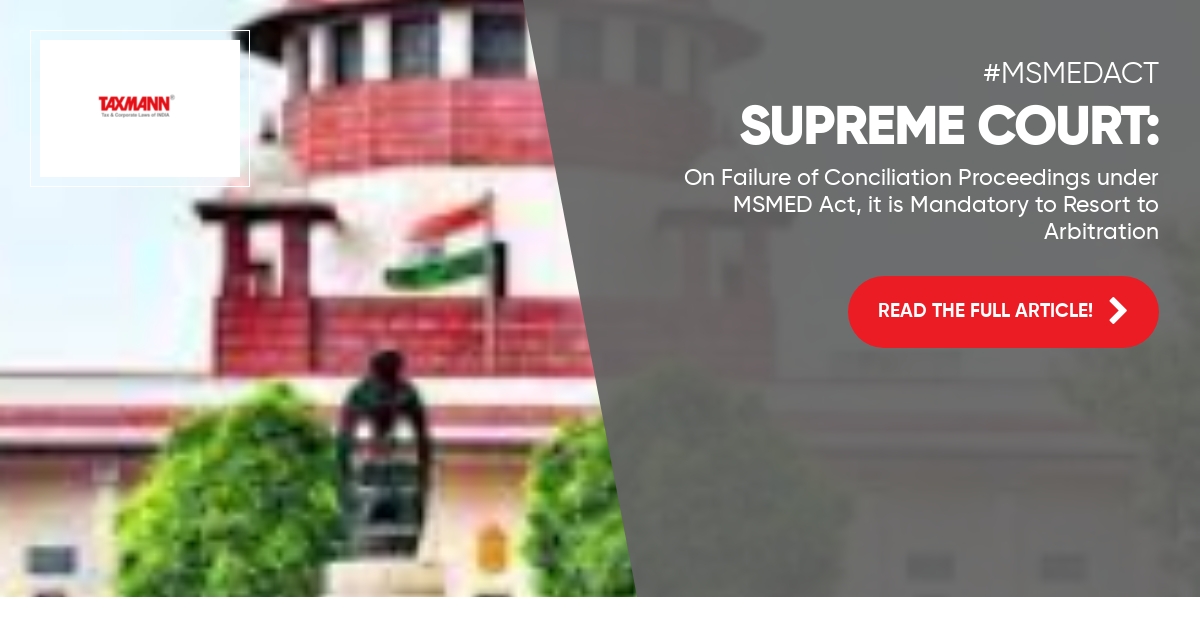On Failure of Conciliation Proceedings under MSMED Act, it is Mandatory to Resort to Arbitration: SC
- Blog|News|Company Law|
- 2 Min Read
- By Taxmann
- |
- Last Updated on 11 March, 2022

Case Details: Jharkhand Urja Vikas Nigam Ltd. v. State of Rajasthan - [2022] 135 taxmann.com 374 (SC)
Judiciary and Counsel Details
-
- Indira Banerjee and R. Subhash Reddy, JJ.
- Shruti Singh, Adv. and Anup Kumar, AOR for the Appellant.
- Dr. Manish Singhvi, Sr. Adv., Arpit Parkash, Adv., Milind Kumar, AOR Kailash Vasdev, Sr. Adv., Nishit Agrawal, AOR Shrey Kapoor, Harsh Mishra and Ms. Upasna Agrawal, Advs. for the Respondent.
Facts of the Case
In the instant case, the appellant – successor company of erstwhile Jharkhand State Electricity Board, had entered into a contract with the R3 Anamika Conductors for the supply of ACSR Zebra Conductors. R3 claimed to be a small-scale industry, had approached the R2-Rajasthan Micro and Small Enterprises Facilitation Council, and filed an application for initiating conciliation proceedings against appellant for payment of delayed bill amount in respect of ACSR Zebra Conductors supplied by it to the appellant.
The council issued a summons for the appearance of the appellant before the Council. But the appellant had not appeared. Thereafter, the order was passed by the Council directing the appellant to make the payment to the R3 as claimed, within thirty days from the date of the order.
The said order was under challenge before the High Court by way of the writ petition and the same was dismissed by the Single Judge. An intra-Court appeal preferred by the appellant was also ended in dismissal. Hence, an instant appeal was filed.
“As per section 18(3) of the MSMED Act, if conciliation is not successful, the said proceedings stand terminated and thereafter Council is empowered to take up the dispute for arbitration on its own or refer to any other institution. The said section itself makes it clear that when the arbitration is initiated all the provisions of the Arbitration and Conciliation Act, 1996 will apply, as if arbitration was in pursuance of an arbitration agreement referred under sub-section (1) of section 7 of the Arbitration and Conciliation Act” said SC.
Supreme Court Held
The Supreme Court held that if the appellant had not submitted its reply at the conciliation stage, or failed to appear, Council could, at best, have recorded failure of conciliation and proceeded to initiate arbitration proceedings to adjudicate the dispute and make an award. However, in the instant case, the Council, had not initiated arbitration proceedings and without giving sufficient opportunity to the appellant to participate in the arbitration proceeding had passed an impugned order directing the appellant to make payment to R3.
Allowing the appeal against the order the Supreme Court observed that the order passed by the Council was a nullity and runs contrary not only to provisions of MSMED Act but contrary to various mandatory provisions of Arbitration and Conciliation Act.
List of Cases Referred to
-
- Raj Kumar Shivhare v. Asstt. Director, Directorate of Enforcement [2010] 100 SCL 211 (SC) (para 6).
Disclaimer: The content/information published on the website is only for general information of the user and shall not be construed as legal advice. While the Taxmann has exercised reasonable efforts to ensure the veracity of information/content published, Taxmann shall be under no liability in any manner whatsoever for incorrect information, if any.

Taxmann Publications has a dedicated in-house Research & Editorial Team. This team consists of a team of Chartered Accountants, Company Secretaries, and Lawyers. This team works under the guidance and supervision of editor-in-chief Mr Rakesh Bhargava.
The Research and Editorial Team is responsible for developing reliable and accurate content for the readers. The team follows the six-sigma approach to achieve the benchmark of zero error in its publications and research platforms. The team ensures that the following publication guidelines are thoroughly followed while developing the content:
- The statutory material is obtained only from the authorized and reliable sources
- All the latest developments in the judicial and legislative fields are covered
- Prepare the analytical write-ups on current, controversial, and important issues to help the readers to understand the concept and its implications
- Every content published by Taxmann is complete, accurate and lucid
- All evidence-based statements are supported with proper reference to Section, Circular No., Notification No. or citations
- The golden rules of grammar, style and consistency are thoroughly followed
- Font and size that’s easy to read and remain consistent across all imprint and digital publications are applied



 CA | CS | CMA
CA | CS | CMA
